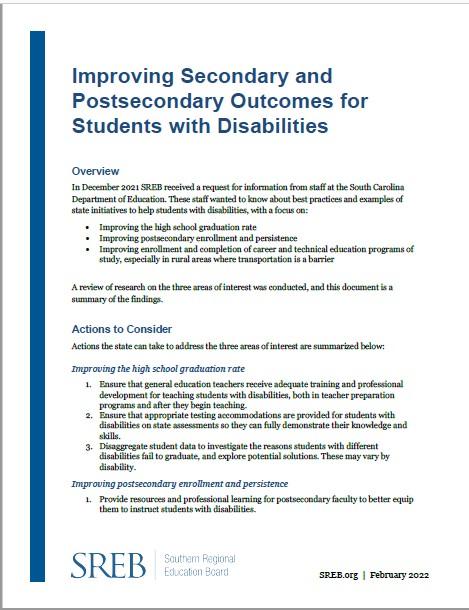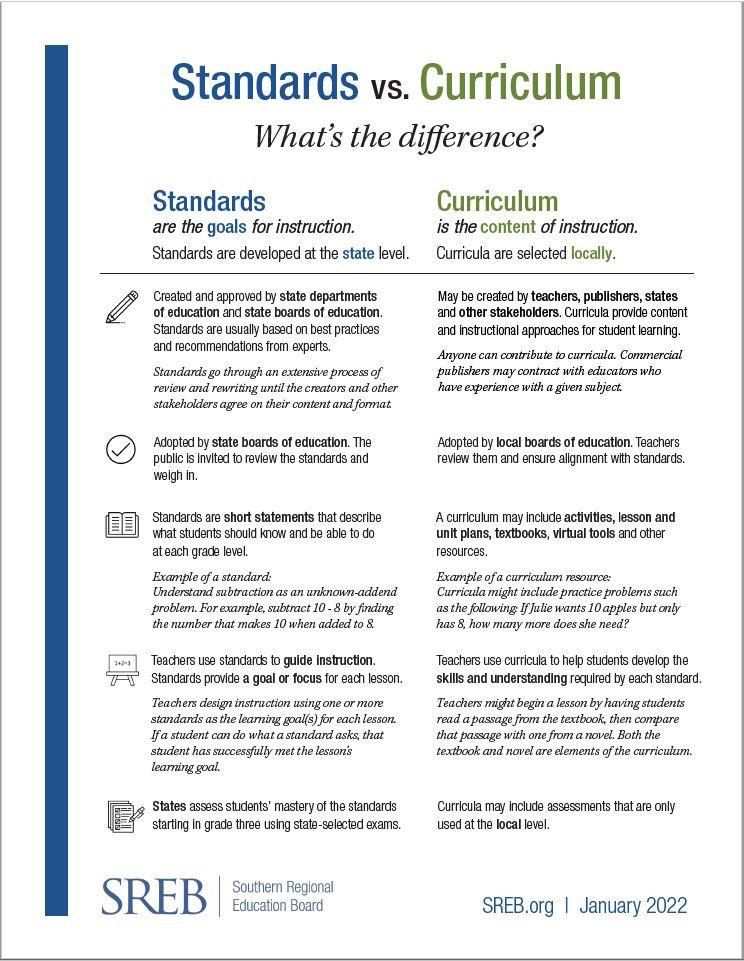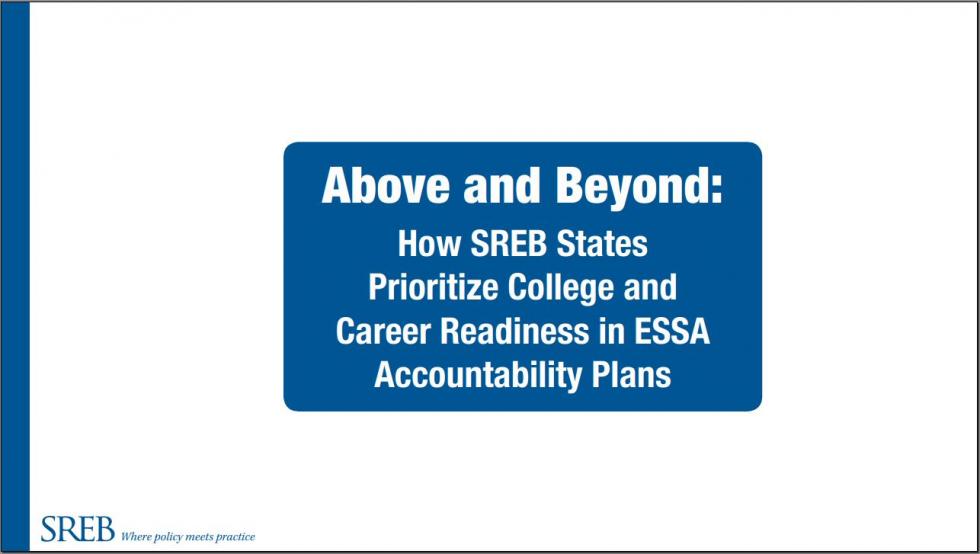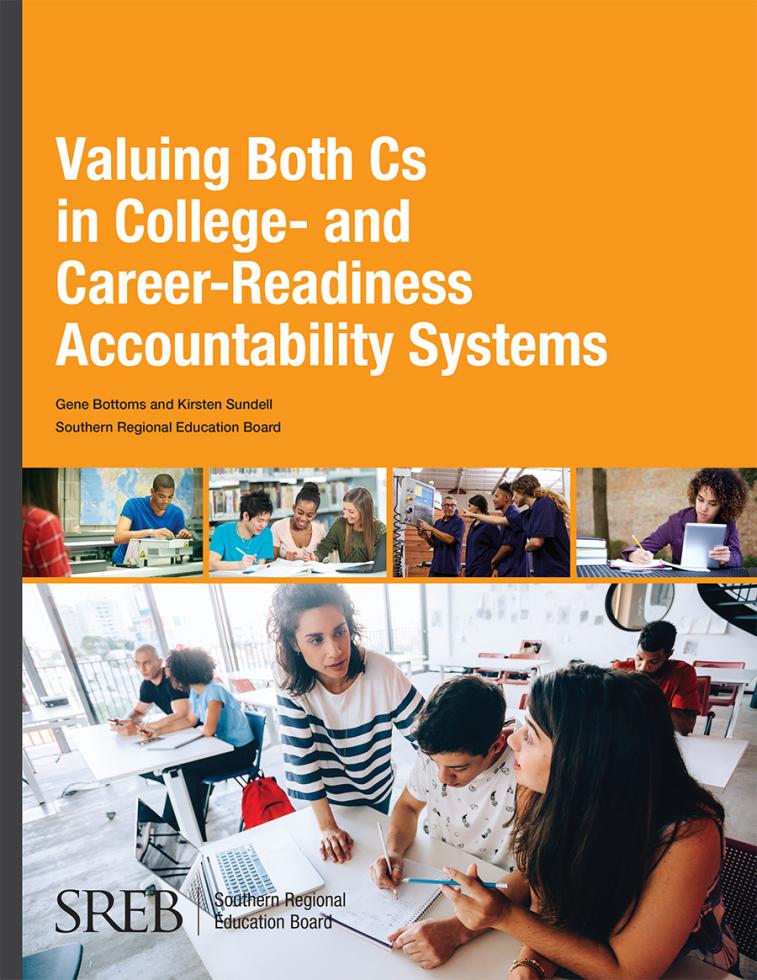Topic: College and Career Readiness
College and Career Readiness
By 2025, two out of every three jobs will require some education beyond high school. Yet far too many students are graduating from high school without the knowledge and skills they need to earn a credential or degree.
Readiness is central to SREB’s core mission of helping states increase educational attainment and grow their economies.
SREB offers policymakers detailed data on policies and how states are using them to improve achievement. And we serve districts and schools with career pathways, curricula and professional learning to help educators prepare students for what comes next in their lives.
Improving Secondary and Postsecondary Outcomes for Students with Disabilities
How can states, schools and colleges help students with disabilities to improve high school graduation rates, postsecondary success, and career and technical education participation?
This piece, produced for a request from a state department of education, includes actions to consider, examples from SREB states and a review of current research on professional development, educational technology and individualized instruction.
Standards vs. Curriculum
What's the difference?
Standards are the goals for instruction. They are developed at the state level. Curriculum is the content of instruction. Curricula are selected locally.
To help people understand the roles of standards and curriculum, SREB prepared this one-page primer.
Above and Beyond: How SREB States Prioritize College and Career Readiness in ESSA Accountability Plans
An SREB analysis of state accountability plans identifies five ways states used flexibility in the Every Student Succeeds Act to prioritize readiness for all students. This regional report of trends across SREB states accompanies individual state profiles on SREB Insights.
Valuing Both Cs in College- and Career-Readiness Accountability Systems
How states can use career pathways to close credential attainment and skills gaps.
This publication explores how state accountability systems currently address college readiness and academic and technical career readiness and offers recommendations and examples of policies and practices that incentivize and reward districts and schools for preparing more students to earn credentials and degrees in high-demand career fields.
How to Close the Readiness Gap Now for Our High School Seniors
Readiness Courses can keep students who are almost ready for college out of remedial classes
Get students the preparation they need during the high school years — not in college, when they have to pay for it.
 Too many students graduate from high
school thinking they’re ready for college, only to find
themselves stuck in remedial classwork once they get
there. This is a tragedy for the students. They believe —
and why not? — that if they’re admitted to college they have what
it takes to succeed there.
Too many students graduate from high
school thinking they’re ready for college, only to find
themselves stuck in remedial classwork once they get
there. This is a tragedy for the students. They believe —
and why not? — that if they’re admitted to college they have what
it takes to succeed there.
Interactive Reports Distill New School Accountability Systems in SREB States
What's in your state's plan?
SREB has published interactive reports on school accountability plans in 16 states. With a focus on college and career readiness, state profiles distill complex information about each state’s plan to help policymakers understand and compare accountability measures.
Study Shows 3 High-Impact Strategies for States
Aligning Classroom Materials to State Readiness Standards
How have schools managed the massive shift of aligning classroom
teaching materials to their states’ college- and career-readiness
standards?
New reports from the Southern Regional Education Board detail how
states approached the challenge and recommend strategies to focus
on as the work continues.
State Policies to Support a Statewide College- and Career-Readiness Agenda
Essential Elements of State Policy for College Completion
A statewide college- and career-readiness agenda signals clearly and universally what knowledge and learning skills or readiness standards are essential for students to succeed in a substantial majority of postsecondary education programs. The standards need to be reinforced by a series of additional steps that include assessment, supplemental course work, and school accountability. SREB’s College- and Career-Readiness Action Agenda includes five essential components across the educational pipeline: 1. Adopt statewide readiness standards. 2. Assess high school juniors for readiness. 3. Offer transitional readiness courses for juniors assessed as underprepared. 4. Apply the standards in college placement. 5. Hold schools accountable.
Transitional Courses for College and Career Readiness
Essential Elements of State Policy for College Completion
Offering high school courses to prepare underprepared students for success in college or career training after graduation is a key strategy to reduce remediation, increase postsecondary completion and provide greater access to making a living wage. This Essential Elements policy brief details efforts in states across the nation, outlines questions policymakers need to address, and recommends 12 essential elements for an effective statewide policy to implement transitional courses.









